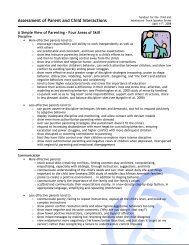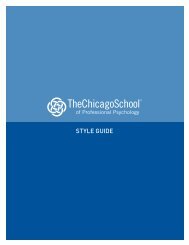Center for Academic Excellence Writing Assessment ... - eGo Main
Center for Academic Excellence Writing Assessment ... - eGo Main
Center for Academic Excellence Writing Assessment ... - eGo Main
Create successful ePaper yourself
Turn your PDF publications into a flip-book with our unique Google optimized e-Paper software.
The Atlantic Online | June 2009 | What Makes Us Happy? | Joshua Wolf Shenk<br />
12/31/09 10:15 PM<br />
anxious kids tend to do poorly in young adulthood, but by age 70, are just as likely as the outgoing kids to be “happy-well.”<br />
Vaillant sums up: “If you follow lives long enough, the risk factors <strong>for</strong> healthy life adjustment change. There is an age to<br />
watch your cholesterol and an age to ignore it.”<br />
The study has yielded some additional subtle surprises. Regular exercise in college predicted late-life mental health better<br />
than it did physical health. And depression turned out to be a major drain on physical health: of the men who were<br />
diagnosed with depression by age 50, more than 70 percent had died or were chronically ill by 63. More broadly, pessimists<br />
seemed to suffer physically in comparison with optimists, perhaps because they’re less likely to connect with others or care<br />
<strong>for</strong> themselves.<br />
More than 80 percent of the Grant Study men served in World War II, a fact that allowed Vaillant to study the effect of<br />
combat. The men who survived heavy fighting developed more chronic physical illnesses and died sooner than those who<br />
saw little or no combat, he found. And “severity of trauma is the best predictor of who is likely to develop PTSD.” (This may<br />
sound obvious, but it countered the claim that post-traumatic stress disorder was just the manifestation of preexisting<br />
troubles.) He also found that personality traits assigned by the psychiatrists in the initial interviews largely predicted who<br />
would become Democrats (descriptions included “sensitive,” “cultural,” and “introspective”) and Republicans (“pragmatic”<br />
and “organized”).<br />
Again and again, Vaillant has returned to his major preoccupations. One is alcoholism, which he found is probably the<br />
horse, and not the cart, of pathology. “People often say, ‘That poor man. His wife left him and he’s taken to drink,’” Vaillant<br />
says. “But when you look closely, you see that he’s begun to drink, and that has helped drive his wife away.” The horrors of<br />
drink so preoccupied Vaillant that he devoted a stand-alone study to it: The Natural History of Alcoholism.<br />
Vaillant’s other main interest is the power of relationships. “It is social aptitude,” he writes, “not intellectual brilliance or<br />
parental social class, that leads to successful aging.” Warm connections are necessary—and if not found in a mother or<br />
father, they can come from siblings, uncles, friends, mentors. The men’s relationships at age 47, he found, predicted late-life<br />
adjustment better than any other variable, except defenses. Good sibling relationships seem especially powerful: 93 percent<br />
of the men who were thriving at age 65 had been close to a brother or sister when younger. In an interview in the March<br />
2008 newsletter to the Grant Study subjects, Vaillant was asked, “What have you learned from the Grant Study men?”<br />
Vaillant’s response: “That the only thing that really matters in life are your relationships to other people.”<br />
The authority of these findings stems in large part from the rarity of the source. Few longitudinal studies survive in good<br />
health <strong>for</strong> whole lifetimes, because funding runs dry and the participants drift away. Vaillant managed, drawing on federal<br />
grants and private gifts, to finance surveys every two years, physicals every five years, and interviews every 15 years. The<br />
original study social worker, Lewise Gregory Davies, helped him goad the subjects to stay in touch, but it wasn’t a hard sell.<br />
The Grant Study men saw themselves as part of an elite club.<br />
Vaillant also dramatically expanded his scope by taking over a defunct study of juvenile delinquents in inner-city Boston,<br />
run by the criminologists Sheldon and Eleanor Glueck. Launched in 1939, the study had a control group of nondelinquent<br />
boys who grew up in similar circumstances—children of poor, mostly <strong>for</strong>eign-born parents, about half of whom lived in a<br />
home without a tub or a shower. In the 1970s, Vaillant and his staff tracked down most of these nondelinquent boys—it took<br />
years—so that today the Harvard Study of Adult Development consists of two cohorts, the “Grant men” and the “Glueck<br />
http://www.theatlantic.com/doc/print/200906/happiness<br />
Page 11 of 20





